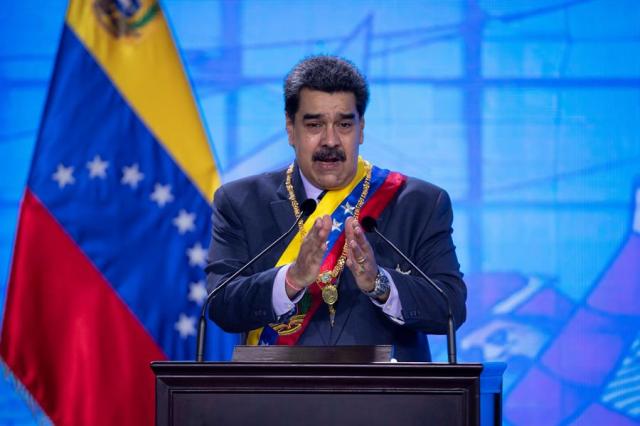
Nicolás Maduro, speaks during the opening ceremony of the Judicial Year 2021, today at the Supreme Court of Justice (TSJ) in Caracas (Venezuela).
Venezuela under the Nicolás Maduro regime has become the worst humanitarian crisis in the Western Hemisphere. While Venezuelans suffer, the Maduro regime has become a host to terrorist and paramilitary groups. Both elements significantly compromise the region’s stability, and the Biden administration can play a central role in resolving this crisis.
By Andrés Guilarte / intpolicydigest
When it came to Venezuela, the Trump administration devoted not only its vocal narrative against Maduro but also put forth a robust set of actions. From increasing the number of sanctions on Venezuelan or Venezuelan-connected individuals to 166, it also engaged in broader sanctions against several industries controlled by the Venezuelan government.
Even though the Biden administration has made a formal statement recognizing Maduro as a dictator and saying that they do not expect to have any direct contact with the regime, the administration has not yet presented a policy plan for dealing with Venezuela.
One of the consequences of Biden delaying the direct engagement of this crisis is that there is now no clear leadership in the international community regarding the appropriate response to challenges in Venezuela. U.S. involvement has been the biggest ally to the Venezuelan campaign for democracy in recent years. This lack of action leaves the Venezuelan people alone in their fight as the Juan Guaidó-led opposition is debilitated.
Last month, after the Maduro regime gained control of the National Assembly through fraudulent parliamentary elections, Guaidó and the opposition reaffirmed their legitimacy and mission of ending the usurpation of the executive by Maduro. But one international reaction to this new development came from the European Union (EU) as they decided to no longer recognize Guaidó as the interim president, and instead now view him as merely a “relevant interlocutor.”
To properly address the Venezuelan crisis, the Biden administration must adopt internal and external policies that can be implemented in the short and long term.
The first policy recommendation is to assist the humanitarian crisis. Over 5 million Venezuelans have fled the country in the past seven years, and the number continues to rise. The Colombian government has already issued temporary protected status for over 1 million Venezuelans in need of migratory relief. The U.S. has between 200,000 and 300,000 Venezuelan refugees that benefited from the Trump administration granting them Deferred Enforced Departure for Venezuelan nationals, which could be changed to a Temporary Protected Status (TPS) if the Biden administration fulfills its campaign promise.
In addition to stabilizing the migratory status of Venezuelans, the Biden administration must also provide financial aid to non-governmental organizations and governments in the region that are helping mitigate the harsh conditions refugees face when leaving their country.
Second, the Biden administration must continue to pressure the Maduro regime. The U.S. should maintain the effort that the Trump administration expanded in targeting the drug industry managed by the Maduro regime through the ongoing Enhanced Anti-Narcotics Operation in the Caribbean. Also, the high number of sanctions on Venezuela can be used to put pressure on members of the regime, but the U.S. must revisit how some broader sanctions, targeting industries like oil, have been adversely impacting the population rather than weakening the regime.
Every action that pressures the regime can be multiplied and made more potent by enhancing regional and international coalitions. The U.S. must push existing allies, like the EU, to increase humanitarian support to Venezuela and follow suit with economic sanctions.
Overall, the Biden administration has an opportunity to move forward on this bipartisan issue and take a stance against the totalitarian regime in Venezuela — reinforcing efforts to return democracy to the country. The only path forward is to create conditions that cast Maduro and his elitist regime out of power.

